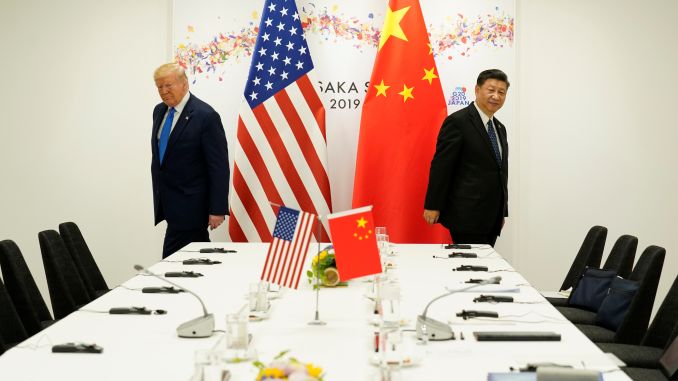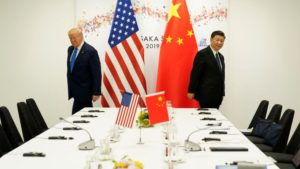U.S. President Donald Trump and top White House officials dismissed concerns that economic growth may be faltering, saying on Sunday they saw little risk of recession despite a volatile week on global bond markets, and insisting their trade war with China was doing no damage to the United States.
“We’re doing tremendously well, our consumers are rich, I gave a tremendous tax cut, and they’re loaded up with money,” Trump said on Sunday.
But he was less optimistic than his aides on striking a trade deal with China, saying that while he believed China was ready to come to an agreement, “I’m not ready to make a deal yet.”
He hinted that the White House would like to see Beijing resolve ongoing protests in Hong Kong first.
“I would like to see Hong Kong worked out in a very humanitarian fashion,” Trump said. “I think it would be very good for the trade deal.”
White House economic adviser Larry Kudlow said trade deputies from the two countries would speak within 10 days and “if those deputies’ meetings pan out… we are planning to have China come to the USA” to advance negotiations over ending a trade battle that has emerged as a potential risk to global economic growth.
Even with the talks stalled for now and the threat of greater tariffs and other trade restrictions hanging over the world economy, Kudlow said on “Fox News Sunday” the United States remained “in pretty good shape.”
“There is no recession in sight,” Kudlow said. “Consumers are working. Their wages are rising. They are spending and they are saving.”
Their comments follow a week in which concerns about a possible U.S. recession weighed on financial markets and seemed to put administration officials on edge about whether the economy would hold up through the 2020 presidential election campaign. Democrats on Sunday argued Trump’s trade policies were posing an acute, short-term risk.
U.S. stock markets tanked last week on recession fears with all three major U.S. indexes closing down about 3% on Wednesday, paring their losses by Friday due to expectations the European Central Bank might cut rates.
The U.S. Federal Reserve and 19 other central banks have already loosened monetary policy in what Fitch Ratings last week described as the largest shift since the 2009 recession.
Markets are expecting more cuts to come. For a brief time last week, bond investors demanded a higher interest rate on 2-year Treasury bonds than for 10-year Treasury bonds, a potential signal of lost faith in near-term economic growth.
White House trade adviser Peter Navarro on Sunday dismissed the idea that last week’s market volatility was a warning sign, saying “good” economic dynamics were encouraging investors to move money to the United States.
“We have the strongest economy in the world and money is coming here for our stock market. It’s also coming here to chase yield in our bond markets,” Navarro told ABC’s “This Week.”
For bond markets, the sort of movement Navarro described is often driven by trouble – in this case the possibility that the trade battle with China is lasting far longer than expected and becoming disruptive to business investment and growth.
The U.S. economy does continue to grow and add jobs each month. Retail sales in July jumped a stronger-than-expected 0.7%, the government reported last week, and Kudlow said that number showed that the main prop of the U.S. economy was intact.
But manufacturing growth has slowed and lagging business investment has become a drag.
A slowdown would be bad news for Trump, who is building his 2020 bid for a second term around the economy’s performance. He told voters at a rally last week they had “no choice” but to vote for him to preserve their jobs and investments.
The president and his advisers have repeatedly accused the Fed of undermining the administration’s economic policies. On Sunday, Kudlow again pointed the finger at the central bank, describing rate hikes through 2017 and 2018 as “very severe monetary restraint.”
The Fed hiked rates seven times over those two years as part of a plan to restore normal monetary policy following emergency steps taken to battle the 2007-2009 global financial crisis and recession.
Even with those steps, the Fed’s target interest rate has remained well below historic norms, and policymakers have started cutting rates in response to growing global risks.
Democratic presidential candidates on Sunday joined the many economic analysts who have said the administration’s sometimes erratic policies on trade – at one point threatening tariffs on Mexico over immigration issues – are to blame for increased uncertainty, disappointing business investment and market volatility.
“I’m afraid that this president is driving the global economy and our economy into recession,” Democratic candidate Beto O’Rourke said on NBC’s “Meet the Press.”
Speaking to CNN’s “State of the Union” on Sunday, Democratic candidate Pete Buttigieg criticized the administration for failing to deliver a deal with China.
“There is clearly no strategy for dealing with the trade war in a way that will lead to results for American farmers, or American consumers,” he said.
Source:Reuters



